It looks like you're using an Ad Blocker.
Please white-list or disable AboveTopSecret.com in your ad-blocking tool.
Thank you.
Some features of ATS will be disabled while you continue to use an ad-blocker.
share:
a reply to: DarknStormy
Assalaamu alaikum.
Being an ex-muslim and ex-Islamic apologist myself,... my response to your question was already a rebuttal in anticipation to the mainstream Islamic preconceived answer you just presented. Check
Your rebuttal is absolutely false and inaccurate, and it is you who has misquoted the Qur'an out of context.
I will be quoting myself from this thread: Islam's Lie: "There Is No Compulsion In Religion" (2:256)
As the verses and sentences of the Qur'an were not revealed in the order written in today's book, we must be mindful to consider the chronological order of Qur'anic revelation, + abrogation, + hadith, and + historic events, in order to fully understand the Qur'an in its proper context according to the life and example of Muhammad.
All of the verses you quoted were revealed during the early beginnings of ordained armed combat. If you continue on to the verses revealed towards the end of Muhammad's life, the biography of Muhammad, and the historic record of events, you will see that Allah, Muhammad, and Islam evolved into a full-fledged conquering military power,.... far from the peace and mercy of the Meccan period and early-Medinan period.
Abrogation, in the Qur'an, is when Allah later changes his mind, contradicts himself, or supersedes an earlier verse for a newer verse. Allah admits to abrogation in the Qur'an in verses 2:106 and 16:101.
"No compulsion in religion" (2:256) was abrogated two years later in favor of jihad against non-believers:
Two years after the "No compulsion in religion" verse was revealed, this is the set of verses that were revealed to abrogate/supersede it:
Verse 1-3 state that Allah and Muhammad are now disassociated from all non-believers.
Verse 4 says to honor the remaining treaties with non-believers only until their predetermined length has expired.
Verse 5 says to kill, enslave, and besiege all non-believers anywhere unless they become Muslim, indicated by "repent, prayer, and zakah".
Chapter 9 of the Qur'an contains many of the last verses to be revealed in Islam including:
And two years after this declaration of all-out jihad against non-Muslims, Muhammad gave his "Farewell Sermon" shortly before his death. In this final sermon, Muhammad states that the only superiority among mankind is religious superiority:
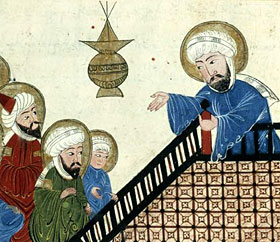
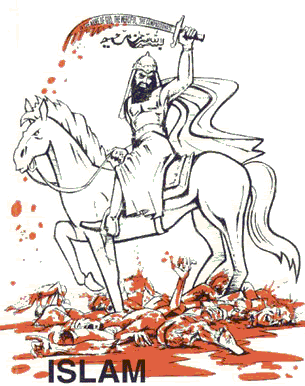
• Point:
In the Qur'an, the jihad in Surah 9 abrogates/supersedes the "no compulsion in religion" verse. Additionally, Muhammad's "Final Sermon" commands religious superiority and the separation of Muslims into "one brotherhood" separate from non-Muslims.
Assalaamu alaikum.
"Thank you for your response and I wouldn't of asked you the questions if I already didn't have an answer for you"
Being an ex-muslim and ex-Islamic apologist myself,... my response to your question was already a rebuttal in anticipation to the mainstream Islamic preconceived answer you just presented. Check
"the parts of the Qu'ran you have quoted are the parts that are usually quoted when someone tries to prove these issues.. But in just about every instance they are taken out of context."
Your rebuttal is absolutely false and inaccurate, and it is you who has misquoted the Qur'an out of context.
I will be quoting myself from this thread: Islam's Lie: "There Is No Compulsion In Religion" (2:256)
As the verses and sentences of the Qur'an were not revealed in the order written in today's book, we must be mindful to consider the chronological order of Qur'anic revelation, + abrogation, + hadith, and + historic events, in order to fully understand the Qur'an in its proper context according to the life and example of Muhammad.
All of the verses you quoted were revealed during the early beginnings of ordained armed combat. If you continue on to the verses revealed towards the end of Muhammad's life, the biography of Muhammad, and the historic record of events, you will see that Allah, Muhammad, and Islam evolved into a full-fledged conquering military power,.... far from the peace and mercy of the Meccan period and early-Medinan period.
Abrogation, in the Qur'an, is when Allah later changes his mind, contradicts himself, or supersedes an earlier verse for a newer verse. Allah admits to abrogation in the Qur'an in verses 2:106 and 16:101.
"No compulsion in religion" (2:256) was abrogated two years later in favor of jihad against non-believers:
But then Allah's saying (There is no compulsion in religion…) was abrogated and the Prophet was commanded to fight the "People of the Book" in Suratul Tawbah”
- Tafsir Al-Wahidi
Ibn Abbas said: it was revealed with regard to a man from the tribe of Bani Salim Ibn Awf called al-Husayni whose two sons converted to Christianity but he was himself a Muslim. He told the Prophet: "Shall I force them to embrace Islam, they insist on Christianity", hence Allah revealed this verse. But, this verse was abrogated by the verse of fighting.
- Tafsir ibn Kathir
Two years after the "No compulsion in religion" verse was revealed, this is the set of verses that were revealed to abrogate/supersede it:
"1. [This is a declaration of] disassociation, from Allah and His Messenger, to those with whom you had made a treaty among the polytheists.
2. So travel freely, [O disbelievers], throughout the land [during] four months but know that you cannot cause failure to Allah and that Allah will disgrace the disbelievers.
3. And [it is] an announcement from Allah and His Messenger to the people on the day of the greater pilgrimage that Allah is disassociated from the disbelievers, and [so is] His Messenger. So if you repent, that is best for you; but if you turn away - then know that you will not cause failure to Allah . And give tidings to those who disbelieve of a painful punishment.
4. Excepted are those with whom you made a treaty among the polytheists and then they have not been deficient toward you in anything or supported anyone against you; so complete for them their treaty until their term [has ended]. Indeed, Allah loves the righteous [who fear Him].
5. And when the sacred months have passed, then kill the polytheists wherever you find them and capture them and besiege them and sit in wait for them at every place of ambush. But if they should repent, establish prayer, and give zakah, let them [go] on their way. Indeed, Allah is Forgiving and Merciful."
- Qur'an, Suratul Tawbah, ayah 1-5 (9:1-5)
Verse 1-3 state that Allah and Muhammad are now disassociated from all non-believers.
Verse 4 says to honor the remaining treaties with non-believers only until their predetermined length has expired.
Verse 5 says to kill, enslave, and besiege all non-believers anywhere unless they become Muslim, indicated by "repent, prayer, and zakah".
Chapter 9 of the Qur'an contains many of the last verses to be revealed in Islam including:
"O you who have believed, fight those near to you of the disbelievers and let them find in you harshness. And know that Allah is with the righteous."
- Quran, Suratul Tawbah, ayat 123 (9:123)
"O Prophet, fight against the disbelievers and the hypocrites and be harsh upon them. And their refuge is Hell, and wretched is the destination."
- Quran, Suratul Tawbah, ayah 73 (9:73)
And two years after this declaration of all-out jihad against non-Muslims, Muhammad gave his "Farewell Sermon" shortly before his death. In this final sermon, Muhammad states that the only superiority among mankind is religious superiority:

"All mankind is from Adam and Eve, an Arab has no superiority over a non-Arab nor a non-Arab has any superiority over an Arab; also a white has no superiority over black nor a black has any superiority over white except by taqwa (piety through the obedience of Allah) and good action. Learn that every Muslim is a brother to every Muslim and that the Muslims constitute one brotherhood."

• Point:
In the Qur'an, the jihad in Surah 9 abrogates/supersedes the "no compulsion in religion" verse. Additionally, Muhammad's "Final Sermon" commands religious superiority and the separation of Muslims into "one brotherhood" separate from non-Muslims.
edit on 9/30/14 by Sahabi because: (no reason given)
Let us look at the actions of Muhammad, while taking the historic chronology of events and Qur’anic abrogated chronology from the op into
consideration:
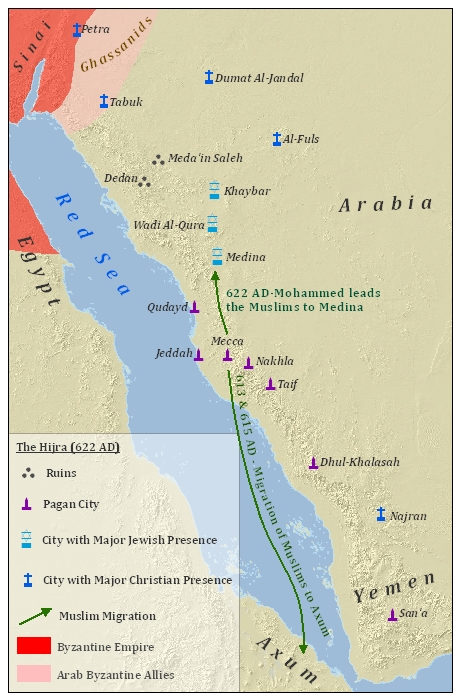
Upon leaving Mecca to establish his stronghold in Medina in 622 CE/AD, Muhammad was still preaching peace, tolerance, and religious freedom. The Jews of Medina, as shown in the following painting, happily welcomed Muhammad as new ruler of Medina. In the early days of Muhammad’s arrival to the new city, the Jewish tribes of Banu Khazraj and Banu Aws merged together with some other smaller Jewish factions and Jewish individuals, converted to Islam, and became known as the Ansar (Helpers).
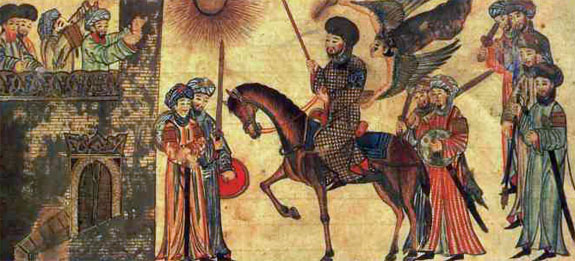
Some Jewish tribes of Medina and its vicinity chose to retain their Jewish heritage, religion, and identity during Muhammad’s reign. Most notable are the tribes of Banu Qaynuqa, Banu Nadir, and Banu Qurayza. All Jews of Medina and the surrounding area were ordered to pay the jizya tax to Muhammad. Jizya is a tax imposed upon non-Muslims living in Muslim lands.
When Muhammad took sovereign reign over his new stronghold of Medina, Allah’s revelations began to break away from the message of peace and began to move towards jihad. Muhammad and his followers began jihad military operations by first attacking and robbing unarmed and unprotected merchant caravans. These aggressive acts of highway robbery helped to strengthen Muhammad’s government and military. These caravan robberies had a tremendous impact upon the markets of the Arabian Peninsula.
As a combined result of the imposed jizya tax and Muhammad’s destabilization of trading and markets in the area, the once welcoming Jews of Medina began to voice public dissident and write degrading accounts and poems about Muhammad. Displeased with the freedom of speech that unhappy Jews were voicing, Muhammad declared unfounded and unsubstantiated accusations of assassination plots being planned against him. Muhammad then ordered many successful assassinations against various Jewish tribe leaders.
The first Jewish tribe of Medina to be targeted was Banu Qaynuga. Muhammad and his army besieged their village for 14 days. Banu Qaynuga then surrendered and all of their land, businesses, wealth, and goods were seized by Muhammad, and the tribe was forcefully expelled from Medina. They eventually settled in Syria.
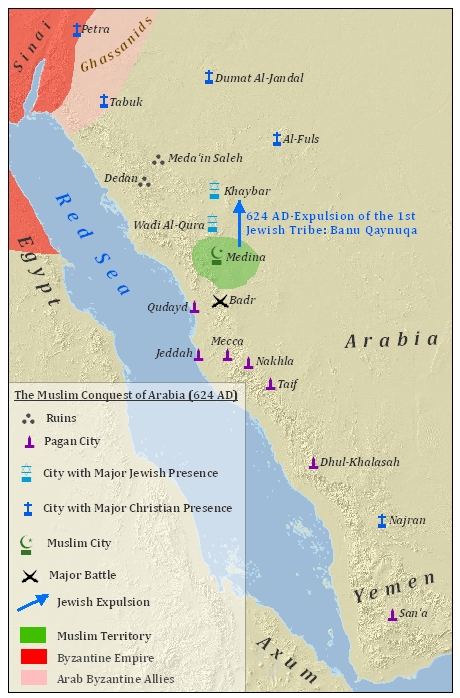
The next group of Jews on Muhammad’s list was Banu Nadir. Their plight is mentioned Here. They were attacked, their wealth, property, and goods were confiscated, their men were executed, and their women and children were enslaved.
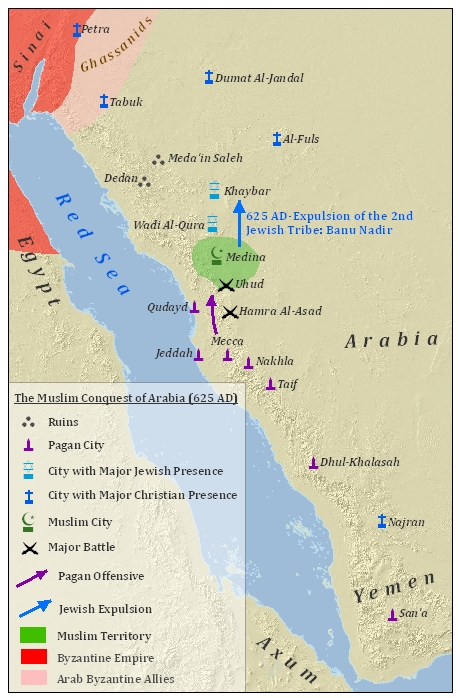
As a result of Muhammad’s indiscriminate robbery of merchant caravans and his tyrannical attacks against Banu Qaynuga and Banu Nadir, the non-muslim Arabs and Jews of the Meccan area launched a failed attack against Muhammad known as The Battle of the Trenches.
During the Battle of the Trenches, the Banu Qurayza tribe remained neutral and did not participate in the war. However, after winning this war, Muhammad turned his army against Banu Qurayza UNPROVKED, and utterly massacred all of their men, enslaved their women, and seized all property, wealth, and goods.
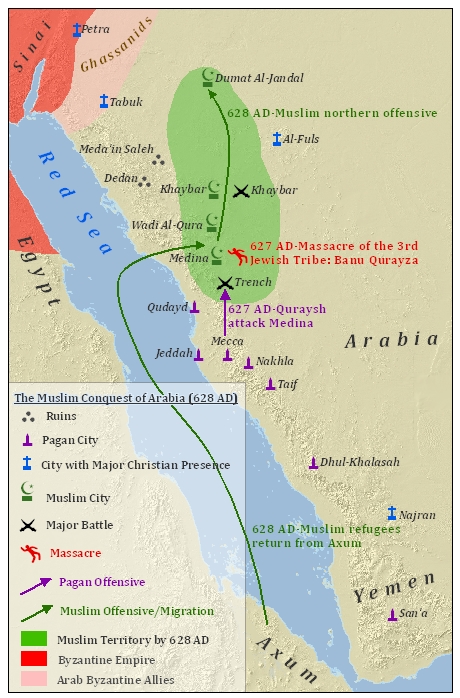
After the robbery, destruction, murder, enslavement, and execution of the Jews of Medina, the Jews who survived gathered with other Jewish groups to the north of Medina in the area of Khaybar. Here the Jews barricaded themselves in their settlement, desperately trying to survive Muhammad’s onslaught.

Muhammad’s forces laid siege to the Jews of Khaybar and after several weeks The Jews surrendered. In order to avoid expulsion or execution, Muhammad ordered that 50% of all of their agricultural harvests would be seized as an alms to Muhammad and his Muslims. However, Muhammad’s second successor Umar ibn al-Khattab later expelled the Jews of Khaybar out of Arabia.
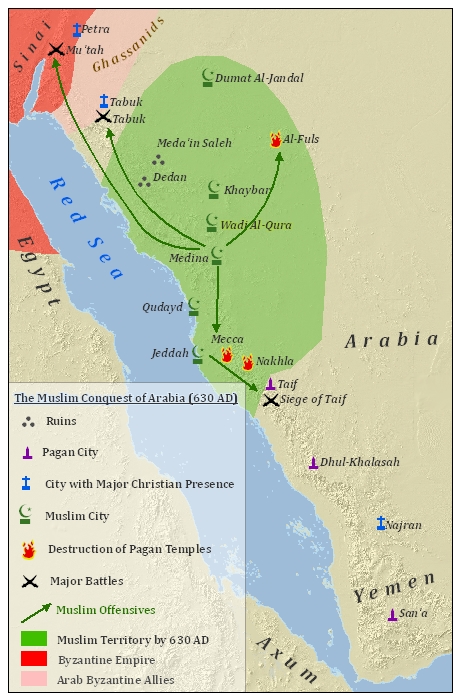
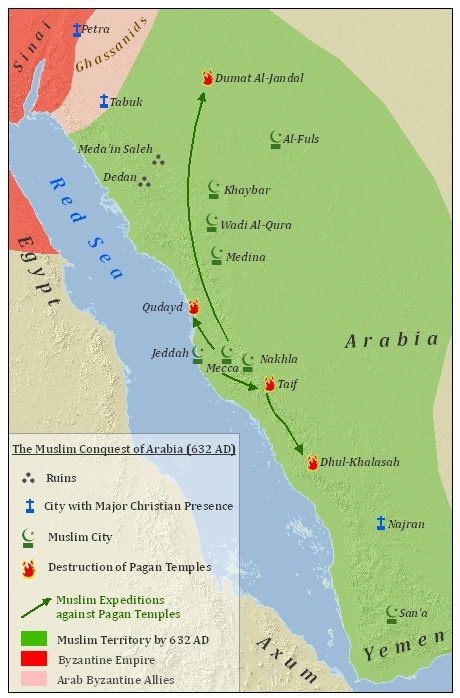
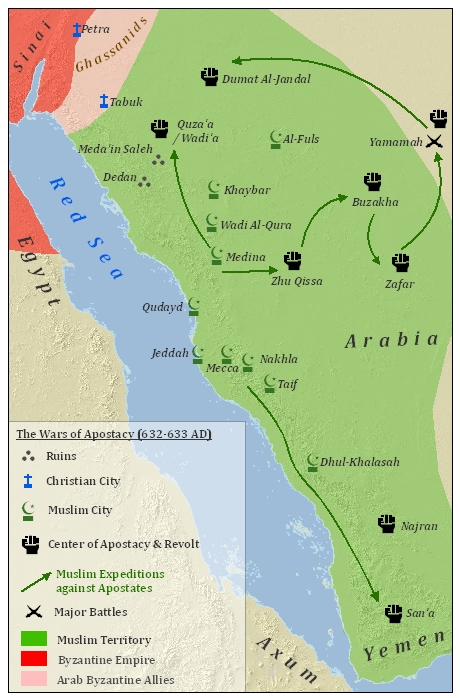
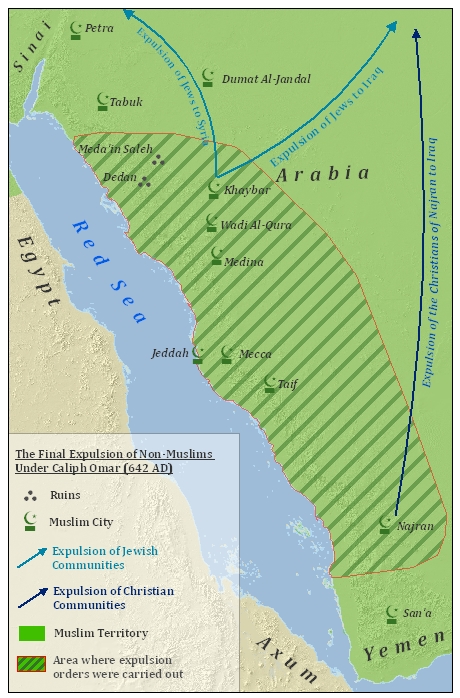
After building-up Islam’s military in Medina, Muhammad and his four immediate successors swept through Arabia and the Middle-East converting and conquering by the sword according to the 9th Chapter of the Qu’an (Suratul Tawbah), which the OP illustrates, Chapter 9 abrogates all earlier proclamations of peace and freedom of religion. All Hadith/Sunnah, Muhammad's biographical accounts, and historic account can easily verify.
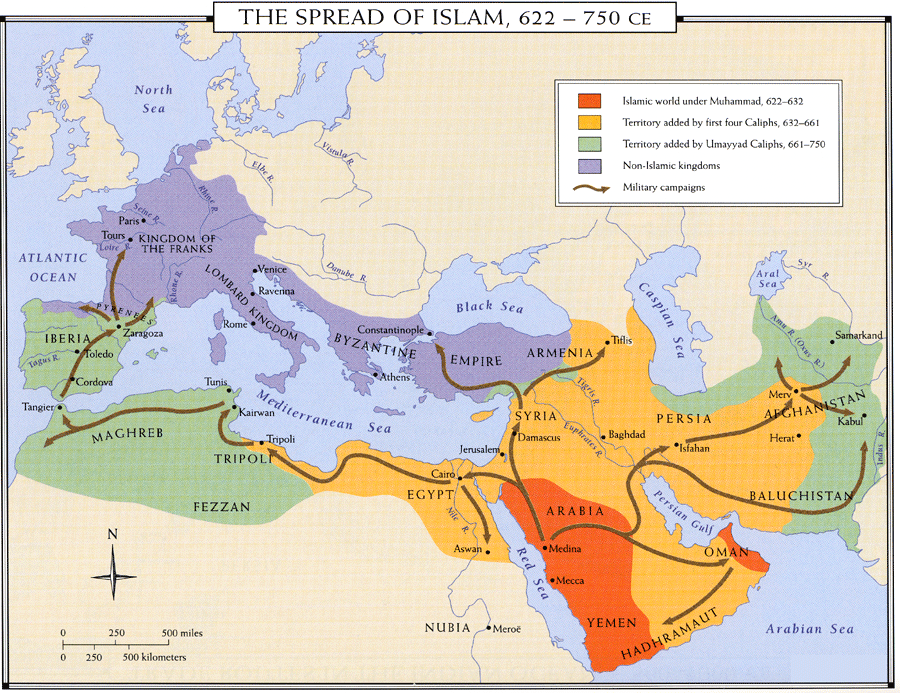

Upon leaving Mecca to establish his stronghold in Medina in 622 CE/AD, Muhammad was still preaching peace, tolerance, and religious freedom. The Jews of Medina, as shown in the following painting, happily welcomed Muhammad as new ruler of Medina. In the early days of Muhammad’s arrival to the new city, the Jewish tribes of Banu Khazraj and Banu Aws merged together with some other smaller Jewish factions and Jewish individuals, converted to Islam, and became known as the Ansar (Helpers).

Some Jewish tribes of Medina and its vicinity chose to retain their Jewish heritage, religion, and identity during Muhammad’s reign. Most notable are the tribes of Banu Qaynuqa, Banu Nadir, and Banu Qurayza. All Jews of Medina and the surrounding area were ordered to pay the jizya tax to Muhammad. Jizya is a tax imposed upon non-Muslims living in Muslim lands.
When Muhammad took sovereign reign over his new stronghold of Medina, Allah’s revelations began to break away from the message of peace and began to move towards jihad. Muhammad and his followers began jihad military operations by first attacking and robbing unarmed and unprotected merchant caravans. These aggressive acts of highway robbery helped to strengthen Muhammad’s government and military. These caravan robberies had a tremendous impact upon the markets of the Arabian Peninsula.
As a combined result of the imposed jizya tax and Muhammad’s destabilization of trading and markets in the area, the once welcoming Jews of Medina began to voice public dissident and write degrading accounts and poems about Muhammad. Displeased with the freedom of speech that unhappy Jews were voicing, Muhammad declared unfounded and unsubstantiated accusations of assassination plots being planned against him. Muhammad then ordered many successful assassinations against various Jewish tribe leaders.
The first Jewish tribe of Medina to be targeted was Banu Qaynuga. Muhammad and his army besieged their village for 14 days. Banu Qaynuga then surrendered and all of their land, businesses, wealth, and goods were seized by Muhammad, and the tribe was forcefully expelled from Medina. They eventually settled in Syria.

The next group of Jews on Muhammad’s list was Banu Nadir. Their plight is mentioned Here. They were attacked, their wealth, property, and goods were confiscated, their men were executed, and their women and children were enslaved.

As a result of Muhammad’s indiscriminate robbery of merchant caravans and his tyrannical attacks against Banu Qaynuga and Banu Nadir, the non-muslim Arabs and Jews of the Meccan area launched a failed attack against Muhammad known as The Battle of the Trenches.
During the Battle of the Trenches, the Banu Qurayza tribe remained neutral and did not participate in the war. However, after winning this war, Muhammad turned his army against Banu Qurayza UNPROVKED, and utterly massacred all of their men, enslaved their women, and seized all property, wealth, and goods.

After the robbery, destruction, murder, enslavement, and execution of the Jews of Medina, the Jews who survived gathered with other Jewish groups to the north of Medina in the area of Khaybar. Here the Jews barricaded themselves in their settlement, desperately trying to survive Muhammad’s onslaught.

Muhammad’s forces laid siege to the Jews of Khaybar and after several weeks The Jews surrendered. In order to avoid expulsion or execution, Muhammad ordered that 50% of all of their agricultural harvests would be seized as an alms to Muhammad and his Muslims. However, Muhammad’s second successor Umar ibn al-Khattab later expelled the Jews of Khaybar out of Arabia.




After building-up Islam’s military in Medina, Muhammad and his four immediate successors swept through Arabia and the Middle-East converting and conquering by the sword according to the 9th Chapter of the Qu’an (Suratul Tawbah), which the OP illustrates, Chapter 9 abrogates all earlier proclamations of peace and freedom of religion. All Hadith/Sunnah, Muhammad's biographical accounts, and historic account can easily verify.

edit on 9/30/14 by Sahabi because: (no reason given)
a reply to: DarknStormy
Your original question was; "Can you point to me where the Qu'ran condones oppression and Slavery?"
I provided evidence Here, and your response only further supported Islam's condonation of slavery.
Allah and Muhammad had plenty of time to totally and utterly annihilate the barbaric custom of slavery. Instead, Islam only gave limited human rights to slaves.
Yes, Muhammad freed many slaves and the freeing of slaves was considered a great act of righteousness, however, according to Islam, the keeping of slaves is completely lawful and acceptable. Yes, Muhammad declared that slaves should be free from cruelty, however, Muhammad fell short by allowing it lawful to have sex with slaves, whether by mutual consent, force, or rape (Quran: 33:50, 23:5-6, 4:24)
It is perfectly clear according to all academic domains, be they Islamic, Western, or Eastern,... that Allah and Muhammad intentionally left a finalized, fully complete, and in Allah's words; "This day have I perfected your religion for you, completed My favour upon you, and have chosen for you Islam as your religion." (Qur'an 5:3)
Meaning, Islam was meant to be followed in its final and "perfect" form.
As Islam never-ever outlawed slavery, I want you to think about the little children and the women in your family,... your daughters, your sons, your wife, your sisters, your aunts, your mother, your nieces and nephews,... think very deeply upon them.
Under any circumstances, whatsoever, would you be ok with people of other religions enslaving them? Forcing them to work for free? Forcing the women and girls to have sex even against their will? Will it make you feel better to know that, although they are slaves, Islam doesn't allow them to be maimed, castrated, or murdered?,... just forcefully worked, and forcefully sexed?
Well, that is exactly what Islam allows itself to do,... and that is exactly what Muhammad and his followers did to the Jews of Medina and Arabia. The non-Muslims were enslaved by pre-emptive attacks that were unprovoked, based upon unsubstantiated claims and lies,... as mentioned in the posts above.
Sugar-coating slavery and giving slaves limited human rights does not change the fact that slavery is extremely vile and evil,... but lawful according to Islam's "perfect" religion.
Slavery
[The prophet had clearly stated, “If anyone kills a slave, we shall kill him. If anyone maims a slave, we shall maim him as well. If anyone castrates his slave, we shall castrate him.”(Muslim, Abu Dawood)]
["Let those who find not the wherewithal for marriage keep themselves chaste, until God gives them means out of His grace. And if any of your slaves ask for a deed in writing (to enable them to earn their freedom for a certain sum), give them such a deed if ye know any good in them: yea, give them something yourselves out of the means which God has given to you. But force not your maids to prostitution when they desire chastity, in order that ye may make a gain in the goods of this life. But if anyone compels them, yet, after such compulsion, is God, Oft-Forgiving, Most Merciful (to them)," (24:33)]
The Prophet himself freed Slaves whilst adopting and marrying some also.
[The Islamic prophet Muhammad encouraged manumission of slaves, even if one had to purchase them first. On many occasions, Muhammad's companions, at his direction, freed slaves in abundance. Muhammad personally freed 63 slaves, and his wife Aisha freed 67. In total his household and friends freed 39,237 slaves. The most notable of Muhammad's slaves were: Safiyya bint Huyayy, whom he freed and married; Maria al-Qibtiyya, given to Muhammad by a Sassanid official, whom he freed and who may have become his wife; Sirin, Maria's sister, whom he freed and married to the poet Hassan ibn Thabit and Zayd ibn Harithah, whom Muhammad freed and adopted as a son.]
Yes I know it's Wikipedia but I'm sure the information can be found elsewhere..
The truth of the matter was, slavery was a common practice back in the day and was also only up until a century or so ago in the West.. God, the explanation above sounds like when a person quits their job lol, they get some money to keep them going and are released.
Your original question was; "Can you point to me where the Qu'ran condones oppression and Slavery?"
I provided evidence Here, and your response only further supported Islam's condonation of slavery.
Allah and Muhammad had plenty of time to totally and utterly annihilate the barbaric custom of slavery. Instead, Islam only gave limited human rights to slaves.
Yes, Muhammad freed many slaves and the freeing of slaves was considered a great act of righteousness, however, according to Islam, the keeping of slaves is completely lawful and acceptable. Yes, Muhammad declared that slaves should be free from cruelty, however, Muhammad fell short by allowing it lawful to have sex with slaves, whether by mutual consent, force, or rape (Quran: 33:50, 23:5-6, 4:24)
It is perfectly clear according to all academic domains, be they Islamic, Western, or Eastern,... that Allah and Muhammad intentionally left a finalized, fully complete, and in Allah's words; "This day have I perfected your religion for you, completed My favour upon you, and have chosen for you Islam as your religion." (Qur'an 5:3)
Meaning, Islam was meant to be followed in its final and "perfect" form.
As Islam never-ever outlawed slavery, I want you to think about the little children and the women in your family,... your daughters, your sons, your wife, your sisters, your aunts, your mother, your nieces and nephews,... think very deeply upon them.
Under any circumstances, whatsoever, would you be ok with people of other religions enslaving them? Forcing them to work for free? Forcing the women and girls to have sex even against their will? Will it make you feel better to know that, although they are slaves, Islam doesn't allow them to be maimed, castrated, or murdered?,... just forcefully worked, and forcefully sexed?
Well, that is exactly what Islam allows itself to do,... and that is exactly what Muhammad and his followers did to the Jews of Medina and Arabia. The non-Muslims were enslaved by pre-emptive attacks that were unprovoked, based upon unsubstantiated claims and lies,... as mentioned in the posts above.
Sugar-coating slavery and giving slaves limited human rights does not change the fact that slavery is extremely vile and evil,... but lawful according to Islam's "perfect" religion.
originally posted by: OpinionatedB
reply to post by Sahabi
why would I? Its not like you want to discuss the info in the OP or you would have gone to a website full of muslims....
You want to say lookey here muslims are wrong.... lol.... have fun with that
you told me all I needed to know when you wouldn't even google al quran an natiq to find out what I meant by what I said
Your entire presence in this thread makes your motives quite obvious. Although you will deny it, I will lay it out for you anyway. The fact that you keep attacking the OP and his motives, claiming first that his information is not worth refuting, and then claiming that this is not the place for such a refutation, leads me to believe that you are blindly following Islam, as you do not possess an adequate knowledge of the religion to even know how to refute the claims. The OP was chock-full of information, historically accurate I might add, and while you claim it is incorrect I have not seen you attempt to make a single refutation of the information- while the OP on the other hand has done a masterful job of laying out what he believes to be evidence for his point. You can claim you're right all you want, you can attack the OP and his religious background all you want, but that doesn't change the fact that your posts have no substance and you are defeating your purpose, which is obviously to dispel any idea of negativity directed towards Islam. You are defeating your purpose because you are not making any arguments.
Everything is corruptible, even in higher realms,
Quite a claim. Can you back that up with proof/evidence?
I am not the first to ask for proof for anything usually, but that's quite an all-encompassing blanket statement that requires a bit of explanation, elaboration, proof or evidence to be taken seriously.
Sure, a lot of EARTHLY things are 'corruptible', as you can't expect perfection from creatures that are barely reaching the first half of level one.
Jesus wasn't corrupted, though. Why was it necessary for Mary to have a "virgin birth"? It was exactly because of the contrast between faulty, young, learning and developing species and True Humans, who are not 'corruptible' anymore. We all evolve spiritually towards perfection, and after a certain level, we cannot be corrupted.
Besides, when you say "everything", and "even in higher realms", you basically mean the whole Universe and everything that exists, from a banana peel to a galaxy. That alone should reflect how ludicrous your claim is. How do you 'corrupt' a grain of sand, for example?
Or an atom? A neutron? A photon?
I am willing to take as a logical thought the statement that "most 'regular people' that have lived on this planet after the Golden Age of Egypt (around 10000 years ago, after the Atlantis-disaster) have been and are 'corruptible'".
Sure. You get no argument from me. If you say all politicians are corrupted or 'corruptible', I would have to say it's probably true, although I don't know each politician of the whole planet, and can't thus completely verify that claim.
If you say that all books that any mass of people on this planet considers 'holy' or 'respected' in some way, probably contains distorted messages, imagination, and even 'corruption' to some extent, I would not want to argue against that, as it is most likely very true indeed. The Bible has some remained truth in it (mainly the teachings of The Oiled One and the commandments and such), but also some distorted, twisted and 'corrupted' bits (for example the removal of 'rebirth/reincarnation' that was originally there, and the addition of 'heaven/hell'-concepts, when TPTB decided it'd be a great tool to control the masses).
It also has lots of simple human imagination in it, and the description of how everything began is symbolic at best, and bears not much resemblance to what really happened (there's a bit of similarity in that the male of the species was created first, and that it seems that some E.T. groups call the people of Terra "Adam-specieses" (is 'specieses' the right word?))
But although dogs can be treated badly and a lot of psychological symptoms can be made to appear that would never appear in the nature, can you really say you can 'corrupt' a dog? You can make a dog vicious, you can make a dog super-afraid, you can make a dog anxious, tense, neurotic or aggressive - but can you truly and really CORRUPT a dog?
I don't think so.
Can you corrupt a palm tree? An ocean-liner?
Not everything is corruptible. I hope that's clear by now.
And not everyone is corruptible, either. You can brainwash an honest individual, you can social engineer him, you can hypnotise him or perform all kinds of tricks - but there's no way you can corrupt him.
No one could ever have corrupted Jesus, for example. That's exactly WHY he had to have a 'virgin birth', because to keep the message pure, he had to be a 'divine being' instead of a regular human (he was a level three individual - as much as true 'individualism' exists on that level), and a regular human body could not contain such a being, the power would be too much. So the sperm also had to come from a higher being that would then create a body that would be compatible with such a high level of energy and soul.
That's why Maria was artificially inseminated by the Extra-Terrestrial people working with the project. I can write a more detailed description of that (from an E.T. channeling, at least allegedly (I know how most people in ATS hate the omission of this word, so here you go)), but that'd be a bit beyond the scope of this small post.
The point is, when the messenger is 'incorruptible', the message remains pure and true. But there are lots of messengers that are not pure, so the message gets distorted and 'corrupted'.
In higher realms - I take it that you mean the Astral Plane mainly - there are of course all kinds of beings and souls, just like there are all kinds of beings and souls here - a soul doesn't change completely just because you take a heavy physical body off of him. You wouldn't expect someone to completely change just because they take off their jacket - it's the same principle. But lying is not as possible in higher realms, because the truth can be seen directly there, and telepathy is an everyday communication tool - basically you can see anyone's intentions and feelings directly, and they can't easily hide them.
So 'corruption' doesn't mean much in higher realms, and besides, since there aren't governments there, there's no money there, there's no need for food (although you can have it if you want it), and so on, any "corruption" would pretty much have lost all its meaning.
The only way I can see a 'corruption' in 'higher realms' having a meaning is when some untrained bozo channels some prankster, trickster, a con-artist or other either a playful spirit or just a spiteful, hateful entity (perhaps it was a feminist when living on Terra), that then claims to be Elvis or Buddha or whoever, and everyone believes them.. but that's pretty harmless, because only an idiot would simply believe everything some spirit decides to say to them through channeling or any other method.
Spirits are just the same guys as you see here, just in a different form - unless you go to other planets or HIGHER realms than the Astral World.
When you enter the Mental Plane or the Causal Plane, there can't be any corruption there - it would either vanish instantly, or it would bring the 'corrupted' individual down so that he couldn't exist in that plane anymore, or it would become so meaningless that it would just vanish because of that.
Obviously you don't know everything about everything, so you probably should refrain from making blanket statements, like that.
A LOT of EARTHLY things are 'corruptible', but it'd be best to remain in the realm of PEOPLE.
So, a lot of people are corruptible, and the point you wanted to make, I think, is that
"nothing on Earth should be trusted to be 'incorruptible', unless you can know for sure that it indeed has not been corrupted, or you have at least investigated and researched it thoroughly and with your intuition and it checks out in all levels (from facts, information, world events to intuition, etc.)."
Isn't that what you really meant?
Jesus certainly wasn't (and most likely isn't) corruptible, otherwise, he would have given in to the temptations and could not have passed the initiation (that is necessary for all messengers).
Buddha wasn't corruptible, otherwise, he'd have given up on his insights and gone back to the hedonism of the Earthly life.
Lao-Tse.. well, you get the idea.
Do you think Bruce Lee was 'corruptible'? He was the most honest celebrity I have ever known of, and his texts even talk about the dangers of the 'celebrity game', when one day you are just a dirty, long-haired young delinguent, and the next day you are suddenly a "star", and everything compliments your long hair and become 'yes' men around you.
I see absolutely no evidence of corruption in any of his texts that I have read, and honesty shines in his interviews (honesty that most people didn't learn from, sadly). Would a corrupted man talk about "honestly expressing yourself"?
People even in these threads say that they want others to be peaceful AND POLITE.
Politeness is a form of lying, it's not honestly expressing yourself. It's programmed behaviour, it's learned behaviour, it's formulaic set of rituals and commands that have fear as the basis. "Oh my, if I don't say 'good morning' to my neighbour and ask 'how they are', they might think I am weird or feel insulted! OH NO! I better do it immediately!"
Only politeness makes it possible for people who hate each other's guts, to behave, as if they are best friends. Is that honesty? No.
I'd rather take an hour-long rant of someone telling me how they hate me and yell at me honestly than take a two-minute 'polite compliments' that are not meant at all.
Politeness is when you say nice things about someone who you'd rather strangle or yell at.
Politeness is lying, it's wrong, and it's completely against honest self-expression, which forms the core of true human interaction. Let people say what they really mean and feel instead of bottling it up and PRETENDING to like each other. That's SICK! That's dispicable! Anyone who is polite, I consider a worse human being than anyone, who honestly yells in anger.
POLIticians are POLIte... and POLIcy enforcers POLIce you unnecessarily. Hm, one could probably write a book about the "POLI"-words, but I hate them all.
Police is supposed to be a peace officer anyway, not a policy enforcer (like he/she is now).
Ok, I have ranted long enough, I think I made my point clear.
edit on 1-10-2014 by Shoujikina because: (no reason given)
I thought of editing my post to add this information, but as it is a long post anyway, I will just create a new one.
There are different levels of existence even in the Astral Plane - whether the "seven-theory" is true or not, I have no idea, but the point is that a 'corrupted' individual would remain in a certain level until he is free of the 'corruption', and then - AND ONLY THEN - would he be able to rise to higher planes.
So let's say all the most dispicable and low-vibrating, hateful and horrible entities reside on level 01. The nice, but 'corrupted' individuals could reside on level 02. Now, level 03 would be already completely free of corruption, because the 'corrupted' individuals simply cannot rise there, before they have 'cleansed' themselves of these heavy elements that bring them down in vibration (you can't be a 'high being' and 'corrupted' simultaneously, and I hope this is obvious). There's no invisible judge that pushes them back - it's just that they can't rise higher if something is making them vibrate low. It's a simple cause-and-effect.
Because of this, the claim that everything is corrupted in higher realms, is obviously false.
Nothing can be corrupted beyond a certain level, because if it was, it would sink back to lower levels. The only way to reach higher levels is to cultivate your soul, to lighten your load, to vibrate higher, to become a better human being, to have less 'heavy elements' bringing you down - those can be destructive emotions, hate, greed, lust, mental disease or even intense passion.
The more harmonious and loving you become, the brighter you will shine, and the higher is your vibration, and the higher levels you will reach in the 'higher realms'.
It's only these lower realms that are so filled with problems and 'corruption', because the low vibration allows it - and because the 'corruption' itself brings the vibration frequency down. In higher realms, corruption is not only impossible because of the whole frequency issue, but also impossible because there's absolutely nothing to gain from being 'corrupted' in higher realms - you have everything you want anyway, so why would you even feel the 'need to be corrupted'?
When you can't feel hunger, cold, hot, or uncomfortable - when you no longer need sleep or even shelter from the elements - what do you need 'corruption' for? What is there to amass in such circumstances? WHY would 'corruption' exist in higher realms?
And HOW would it manifest itself in such a world? I am really curious to know how in your imagination corruption can exist in higher realms.. can you please elaborate and explain, and paint us a picture as to the mechanics of how it works, when no one can be bribed with money, because money doesn't exist (and even if it did, it would have no meaning, because everything is freely available)?
HOW?
There are different levels of existence even in the Astral Plane - whether the "seven-theory" is true or not, I have no idea, but the point is that a 'corrupted' individual would remain in a certain level until he is free of the 'corruption', and then - AND ONLY THEN - would he be able to rise to higher planes.
So let's say all the most dispicable and low-vibrating, hateful and horrible entities reside on level 01. The nice, but 'corrupted' individuals could reside on level 02. Now, level 03 would be already completely free of corruption, because the 'corrupted' individuals simply cannot rise there, before they have 'cleansed' themselves of these heavy elements that bring them down in vibration (you can't be a 'high being' and 'corrupted' simultaneously, and I hope this is obvious). There's no invisible judge that pushes them back - it's just that they can't rise higher if something is making them vibrate low. It's a simple cause-and-effect.
Because of this, the claim that everything is corrupted in higher realms, is obviously false.
Nothing can be corrupted beyond a certain level, because if it was, it would sink back to lower levels. The only way to reach higher levels is to cultivate your soul, to lighten your load, to vibrate higher, to become a better human being, to have less 'heavy elements' bringing you down - those can be destructive emotions, hate, greed, lust, mental disease or even intense passion.
The more harmonious and loving you become, the brighter you will shine, and the higher is your vibration, and the higher levels you will reach in the 'higher realms'.
It's only these lower realms that are so filled with problems and 'corruption', because the low vibration allows it - and because the 'corruption' itself brings the vibration frequency down. In higher realms, corruption is not only impossible because of the whole frequency issue, but also impossible because there's absolutely nothing to gain from being 'corrupted' in higher realms - you have everything you want anyway, so why would you even feel the 'need to be corrupted'?
When you can't feel hunger, cold, hot, or uncomfortable - when you no longer need sleep or even shelter from the elements - what do you need 'corruption' for? What is there to amass in such circumstances? WHY would 'corruption' exist in higher realms?
And HOW would it manifest itself in such a world? I am really curious to know how in your imagination corruption can exist in higher realms.. can you please elaborate and explain, and paint us a picture as to the mechanics of how it works, when no one can be bribed with money, because money doesn't exist (and even if it did, it would have no meaning, because everything is freely available)?
HOW?
a reply to: DarknStormy
I find it interesting that even though Sahabi has returned and is regularly active here, he is unable (Unwilling? Unprepared?) to respond to my post. Perhaps he's building up a behemoth of a response. That'll be interesting!
However, in the mean time, he seems to be continuing to propagate the inaccuracies that I had pointed out, and in his newer posts adding more inaccuracies.
He speaks again about abrogation, and in a form that is not scripturally mandated, i.e. "What comes later automatically negates what came before". In fact, he agrees that abrogation is not applied like that, yet he continues to apply it like that.
So yeah, as I proved to him already (although he seems to have conveniently and persistently ignored), peaceful interaction with non-muslims was nowhere negated by later verses. Each command has its own context.
So yeah, nowhere does Islam advocate violence against non-muslims simply for the sake of them being non-muslim. Nowhere is the "No compulsion in religion" verse abrogated.
Sahabi follows that with some out of context (or with his own created context) verses from the Quran, and a very oddly cobbled together history of early Islam.
For example, the Banu Khazraj and Aus were not jewish tribes. They may have intermarried with the nearby jewish tribes, and had some jewish members, but they were not a jewish tribe at all. And his narrative implies that Muhammad immediately applied a tax on all non-muslims, when in fact, the tax was applied on the jewish tribes AFTER the Battle of Khaybar and Battle of Khandaq, when, despite all being part of the Constitution of Medina (which makes absolutely no mention of a jizya tax), the jews betrayed those within Medina.
I find it interesting that even though Sahabi has returned and is regularly active here, he is unable (Unwilling? Unprepared?) to respond to my post. Perhaps he's building up a behemoth of a response. That'll be interesting!
However, in the mean time, he seems to be continuing to propagate the inaccuracies that I had pointed out, and in his newer posts adding more inaccuracies.
He speaks again about abrogation, and in a form that is not scripturally mandated, i.e. "What comes later automatically negates what came before". In fact, he agrees that abrogation is not applied like that, yet he continues to apply it like that.
So yeah, as I proved to him already (although he seems to have conveniently and persistently ignored), peaceful interaction with non-muslims was nowhere negated by later verses. Each command has its own context.
originally posted by: babloyi
Bukhari, Book 60, #40:
and:--" And fight them till there is no more affliction." Ibn 'Umar said, "We did it, during the lifetime of Allah's Apostle when Islam had only a few followers. A (Muslim) man would be put to trial because of his religion; he would either be killed or tortured. But when the Muslims increased, there was no more afflictions or oppressions."
So yeah, nowhere does Islam advocate violence against non-muslims simply for the sake of them being non-muslim. Nowhere is the "No compulsion in religion" verse abrogated.
Sahabi follows that with some out of context (or with his own created context) verses from the Quran, and a very oddly cobbled together history of early Islam.
For example, the Banu Khazraj and Aus were not jewish tribes. They may have intermarried with the nearby jewish tribes, and had some jewish members, but they were not a jewish tribe at all. And his narrative implies that Muhammad immediately applied a tax on all non-muslims, when in fact, the tax was applied on the jewish tribes AFTER the Battle of Khaybar and Battle of Khandaq, when, despite all being part of the Constitution of Medina (which makes absolutely no mention of a jizya tax), the jews betrayed those within Medina.
edit on 10-10-2014 by babloyi because: (no reason
given)
edit on 10-10-2014 by babloyi because: (no reason given)
Thank you so much for posing this,I have truly enjoyed reading this and found the whole article very enriching. Thank you again and let's hope more
people want to educate themselves.
a reply to: babloyi
Dear brother, I am far from omniscient, however, I have displayed that I am neither "unable" nor "unprepared" to debate in religious matters. Although you may disagree with me, I have not shown myself to be intentionally misleading nor ignorant.
Simply, I would rather spend my life energy and precious time where it is needed. You, personally, do not need my energy nor time, because you seem more interested with Islamic apologetics, rather than a discussion into the reevaluation of the Qur'an.
For example, you completely ignore the major points of the topic that you can not refute, to instead focus on minor theological/doctrinal/sectarian disagreements, semantical use of wording, and editorial and typographical errors. I do, however, thank you for the proof-read corrections, as I do not (did not) have my writings checked-over by another before posting.
"I find it interesting that even though Sahabi has returned and is regularly active here, he is unable (Unwilling? Unprepared?) to respond to my post. Perhaps he's building up a behemoth of a response. That'll be interesting!"
Dear brother, I am far from omniscient, however, I have displayed that I am neither "unable" nor "unprepared" to debate in religious matters. Although you may disagree with me, I have not shown myself to be intentionally misleading nor ignorant.
Simply, I would rather spend my life energy and precious time where it is needed. You, personally, do not need my energy nor time, because you seem more interested with Islamic apologetics, rather than a discussion into the reevaluation of the Qur'an.
For example, you completely ignore the major points of the topic that you can not refute, to instead focus on minor theological/doctrinal/sectarian disagreements, semantical use of wording, and editorial and typographical errors. I do, however, thank you for the proof-read corrections, as I do not (did not) have my writings checked-over by another before posting.
a reply to: babloyi
Thank you very much for this correction. It was an honest typographic oversight. I understand that you may not like this answer, but it is beyond obvious. Here is the quotation in question:
1. I provided clickable links for both Khazraj and Aws/Aus. In those links, it blatantly states that these two tribes are Arabian tribes. I do know this and have nothing to hide or lie about; I made an honest typing error.
2. A lot of information in this thread was taken from my personal copy of the renowned biography, "Ar-Raheeq Al-Makhtum" (The Sealed Nectar). On pages 8-9 of this book, it clearly states:
Once again, this is a fact that I am familiar with. The entire context and events of my post are factual, simply remove the typographic error. Thank you again for pointing it out.
"For example, the Banu Khazraj and Aus were not jewish tribes. They may have intermarried with the nearby jewish tribes, and had some jewish members, but they were not a jewish tribe at all."
Thank you very much for this correction. It was an honest typographic oversight. I understand that you may not like this answer, but it is beyond obvious. Here is the quotation in question:
"In the early days of Muhammad’s arrival to the new city, the Jewish tribes of Banu Khazraj and Banu Aws merged together with some other smaller Jewish factions and Jewish individuals, converted to Islam, and became known as the Ansar (Helpers).
1. I provided clickable links for both Khazraj and Aws/Aus. In those links, it blatantly states that these two tribes are Arabian tribes. I do know this and have nothing to hide or lie about; I made an honest typing error.
2. A lot of information in this thread was taken from my personal copy of the renowned biography, "Ar-Raheeq Al-Makhtum" (The Sealed Nectar). On pages 8-9 of this book, it clearly states:
The pure Arabs – the people of Qahtan – originally lived in Yemen and comprised many tribes, two of which were very famous:
a. Himyar: The most famous of whose septs were Zaid Al-Jamhur, Quda‘a and Sakasic.
b. Kahlan: The most famous of whose septs were Hamdan, Anmar, Tai’, Mudhhij, Kinda, Lakhm, Judham, Azd, Aws, Khazraj and the descendants of Jafna — the kings of old Syria.
Kahlan septs emigrated from Yemen to dwell in the different parts of the Arabian Peninsula prior to the Great Flood (Sail Al-‘Arim of Ma’rib Dam), due to the failure of trade under the Roman pressure and domain on both sea and land trade routes following Roman occupation of Egypt and Syria.
Naturally enough, the competition between Kahlan and Himyar led to the evacuation of the first and the settlement of the second in Yemen.
The emigrating septs of Kahlan can be divided into four groups:
1. Azd: Who, under the leadership of ‘Imran bin ‘Amr Muzaiqb, wandered in Yemen, sent pioneers and finally headed northwards. Details of their emigration can be summed up as follows:
Tha‘labah bin ‘Amr left his tribe Al-Azd for Hijaz and dwelt between Tha‘labiyah and Dhi Qar. When he gained strength, he headed for Madinah where he stayed. Of his seed are Aws and Khazraj, sons of Haritha bin Tha‘labah.
Haritha bin ‘Amr, known as Khuza‘a, wandered with his folks in Hijaz until they came to Mar Az-Zahran. Later, they conquered the Haram, and settled in Makkah after having driven away its people, the tribe of Jurhum.
‘Imran bin ‘Amr and his folks went to ‘Oman where they established the tribe of Azd whose children inhabited Tihama and were known as Azd-of-Shanu’a.
Jafna bin ‘Amr and his family, headed for Syria where he settled and initiated the kingdom of Ghassan who was so named after a spring of water, in Hijaz, where they stopped on their way to Syria.
2. Lakhm and Judham: Of whom was Nasr bin Rabi‘a, father of Manadhira, Kings of Heerah.
3. Banu Tai’: Who also emigrated northwards to settle by the so- called Aja and Salma Mountains which were consequently named as Tai’ Mountains.
4. Kinda: Who dwelt in Bahrain but were expelled to Hadramout and Najd where they instituted a powerful government but not for long , for the whole tribe soon faded away.
Once again, this is a fact that I am familiar with. The entire context and events of my post are factual, simply remove the typographic error. Thank you again for pointing it out.
a reply to: babloyi
The Constitution of Medina does not directly mention the term "jizyah," however, the Constitution does, in fact, mandate financial, material, and military duty upon the Jews under Muhammad's kingdom. Able-bodied Jews are asked, but not ordered, to participate in jihad with the Muslim army. If the Jews do not participate in jihad, then they must provide financial support for all war efforts,... this goes for both homeland defense and foreign offensive expeditions.
Muhammad's government was engaged in continuous warfare during the Medinan period, therefore, there was always occasion to enlist soldiers or collect money and materials from the Jews.
You say that taxes were applied "AFTER" the Battle of Khandaq / al-Ahzab (Dhu al-Qi`dah 5 AH / March-April 627 AD/CE) and the Battle of Khaybar (Muharram-Safar 7 AH / May-June 628 AD/CE). However, taxes and alms were levied against the Jews prior:
• Constitution of Medina: 622 CE/AD
- War taxes levied upon Jews
• Invasion of Banu Qaynuqa Shawwal: 2 AH (April 624 AD/CE)
- Revenge killings and blood feuds between Qaynuqa and Muslims, incited by the humiliation of a covered Muslim woman who was publicly de-clothed.
- Banu Qaynuqa refused to pay war taxes and alms.
- Muhammad besieged Banu Qaynuqa, confiscated their wealth and property, and expelled/exiled them from the area.
And his narrative implies that Muhammad immediately applied a tax on all non-muslims, when in fact, the tax was applied on the jewish tribes AFTER the Battle of Khaybar and Battle of Khandaq, when, despite all being part of the Constitution of Medina (which makes absolutely no mention of a jizya tax), the jews betrayed those within Medina."
The Constitution of Medina does not directly mention the term "jizyah," however, the Constitution does, in fact, mandate financial, material, and military duty upon the Jews under Muhammad's kingdom. Able-bodied Jews are asked, but not ordered, to participate in jihad with the Muslim army. If the Jews do not participate in jihad, then they must provide financial support for all war efforts,... this goes for both homeland defense and foreign offensive expeditions.
Muhammad's government was engaged in continuous warfare during the Medinan period, therefore, there was always occasion to enlist soldiers or collect money and materials from the Jews.
24. The Jews pay a share of the expenses of the believers so long as they are at war.
- Ibn Ishaq, "Sirah Rasul Allah"
43. The Jews must pay (for war) with the Muslims. (this clause appears to be for occasions when Jews are not taking part in the war. Clause 37 deals with occasions when they are taking part in war).
- Alfred Guillaume, "The Life of Muhammad"
(Compiled and Translated from Ibn Ishaq sources)
7. The Jews shall contribute to the cost of war so long as they are fighting alongside the believers.
11. Each shall contribute to defending Madinah, in case of a foreign attack, in its respective area.
- Saifur Rahman al-Mubarakpuri, "Sealed Nectar"
You say that taxes were applied "AFTER" the Battle of Khandaq / al-Ahzab (Dhu al-Qi`dah 5 AH / March-April 627 AD/CE) and the Battle of Khaybar (Muharram-Safar 7 AH / May-June 628 AD/CE). However, taxes and alms were levied against the Jews prior:
• Constitution of Medina: 622 CE/AD
- War taxes levied upon Jews
• Invasion of Banu Qaynuqa Shawwal: 2 AH (April 624 AD/CE)
- Revenge killings and blood feuds between Qaynuqa and Muslims, incited by the humiliation of a covered Muslim woman who was publicly de-clothed.
- Banu Qaynuqa refused to pay war taxes and alms.
- Muhammad besieged Banu Qaynuqa, confiscated their wealth and property, and expelled/exiled them from the area.
a reply to: babloyi
It is, in fact, the Qur'an that is out of context and cobbled together. There are verses and sentences jumbled together that jump from idea-to-idea, concept-to-concept, and time period to time period. There is no fluidity of idea or thought in the Qur'an,... only a pattern of audible rhyme.
The Qur'an is strung-together by out-of-sequence and out-of-context separate revelations from across a 23 year period.
To fully understand the Qur'an in its proper context, we must first consider when, where, and why each individual sentence and verse was revealed.
Next, we must consider each sentence and verse-grouping individually, in correlation and connection to the sirah (life) and sunnah (example) of Muhammad.
Finally, we must consider all of this in correlation to actual historic record.
This is an established Islamic academic science. If this is not the best and most accurate methodology to understand the Qur'an, then please enlighten us into your personal Qur'anic science.
Sahabi follows that with some out of context (or with his own created context) verses from the Quran, and a very oddly cobbled together history of early Islam.
It is, in fact, the Qur'an that is out of context and cobbled together. There are verses and sentences jumbled together that jump from idea-to-idea, concept-to-concept, and time period to time period. There is no fluidity of idea or thought in the Qur'an,... only a pattern of audible rhyme.
The Qur'an is strung-together by out-of-sequence and out-of-context separate revelations from across a 23 year period.
To fully understand the Qur'an in its proper context, we must first consider when, where, and why each individual sentence and verse was revealed.
Next, we must consider each sentence and verse-grouping individually, in correlation and connection to the sirah (life) and sunnah (example) of Muhammad.
Finally, we must consider all of this in correlation to actual historic record.
This is an established Islamic academic science. If this is not the best and most accurate methodology to understand the Qur'an, then please enlighten us into your personal Qur'anic science.
a reply to: babloyi
I did not apply abrogation in the way you accuse. I applied abrogation according to a sound, Islamic methodology:
1. Consider the why, when, and where each verse was revealed.
2. Correlate the verses to the sirah (life) and sunnah (example) of Muhammad.
3. Correlate the verses to the historic record.
4. Correlate the verses to hadith,... to the sayings/actions of the sahaba (disciples of Muhammad),... to the sayings/actions of Muhammad's immediate successors,... and to the sayings/actions of Islamic scholars.
The abrogations I present stand on these 4 points. If this is not the best and most accurate methodology to understand abrogations, then please enlighten us into your personal science of abrogation.
He speaks again about abrogation, and in a form that is not scripturally mandated, i.e. "What comes later automatically negates what came before". In fact, he agrees that abrogation is not applied like that, yet he continues to apply it like that.
I did not apply abrogation in the way you accuse. I applied abrogation according to a sound, Islamic methodology:
1. Consider the why, when, and where each verse was revealed.
2. Correlate the verses to the sirah (life) and sunnah (example) of Muhammad.
3. Correlate the verses to the historic record.
4. Correlate the verses to hadith,... to the sayings/actions of the sahaba (disciples of Muhammad),... to the sayings/actions of Muhammad's immediate successors,... and to the sayings/actions of Islamic scholars.
The abrogations I present stand on these 4 points. If this is not the best and most accurate methodology to understand abrogations, then please enlighten us into your personal science of abrogation.
a reply to: babloyi
The 3 opening posts of the thread, Islam's Lie: "There Is No Compulsion In Religion" (2:256) utterly and absolutely disproves your general statement.
• Point: "No compulsion in religion" was revealed in order to stop an Ansari baby from being raised as a Jew.
• Point: In the Qur'an, the jihad in Surah 9 abrogates/supersedes the "no compulsion in religion" verse. Additionally, Muhammad's "Final Sermon" commands religious superiority and the separation of Muslims into "one brotherhood" separate from non-Muslims.
These points are substantiated by:
1. Considering the why, when, and where each verse was revealed.
2. Correlating the verses to the sirah (life) and sunnah (example) of Muhammad.
3. Correlating the verses to the historic record.
4. Correlating the verses to hadith,... to the sayings/actions of the sahaba (disciples of Muhammad),... to the sayings/actions of Muhammad's immediate successors,... and to the sayings/actions of Islamic scholars.
"peaceful interaction with non-muslims was nowhere negated by later verses. Each command has its own context."
The 3 opening posts of the thread, Islam's Lie: "There Is No Compulsion In Religion" (2:256) utterly and absolutely disproves your general statement.
• Point: "No compulsion in religion" was revealed in order to stop an Ansari baby from being raised as a Jew.
• Point: In the Qur'an, the jihad in Surah 9 abrogates/supersedes the "no compulsion in religion" verse. Additionally, Muhammad's "Final Sermon" commands religious superiority and the separation of Muslims into "one brotherhood" separate from non-Muslims.
These points are substantiated by:
1. Considering the why, when, and where each verse was revealed.
2. Correlating the verses to the sirah (life) and sunnah (example) of Muhammad.
3. Correlating the verses to the historic record.
4. Correlating the verses to hadith,... to the sayings/actions of the sahaba (disciples of Muhammad),... to the sayings/actions of Muhammad's immediate successors,... and to the sayings/actions of Islamic scholars.
a reply to: babloyi
You quoted the following hadith:
There was no more affliction or oppression because Muhammad and his successors launched military operations to intimidate, expel, subdue, conquer, and annihilate all opposition in Arabia.
You quoted the following hadith:
Bukhari, Book 60, #40:
and:--" And fight them till there is no more affliction." Ibn 'Umar said, "We did it, during the lifetime of Allah's Apostle when Islam had only a few followers. A (Muslim) man would be put to trial because of his religion; he would either be killed or tortured. But when the Muslims increased, there was no more afflictions or oppressions."
There was no more affliction or oppression because Muhammad and his successors launched military operations to intimidate, expel, subdue, conquer, and annihilate all opposition in Arabia.
a reply to: Sahabi
Hey Sahabi!
Nice to hear from you! I'm sorry if your entire thread rests on "minor theological/doctrinal/sectarian disagreements, semantical use of wording, and editorial and typographical errors". I cannot help it.
It is interesting how "apologetics" has become a sort of slur. I suppose it has something to do with the english understanding of the word "apology". I don't really see what I do here as apologetics, more like correcting inaccuracies and falsehoods (in fact, I participate in non-muslim threads when I see someone has said something I know to be wrong relating to other religions as well) along with a tiny bit of occasional learning.
As for the constitution of Medina, we have this, which you seem to have missed:
Either way, I'm glad we've established that there was no jizya levied on the jews before the tribe betrayed the muslims, which is what your analysis said. What DID happen was equal protection (in terms of fighting and resources) for both the muslims and jews.
I really do find it hilarious how detractors of the Quran love to go on about how it is out of context, cobbled together, jumbled together, and can only be understood through the sirat and hadith etc. Muslims read it every single day, some of them children who have not even passed highschool. They don't seem to have any issue understanding it. I'd suspect the people with these accusations have some brain deficiency or something, but the far simpler answer is they've never read the Quran for more than a verse or two (that has been quoted sans the rest of the surah like here). But why then do you parrot these points, Sahabi? I doubt you're deficient of the brain, and you surely have read the Quran.
Well, I suppose it WAS an islamic methodology, except it is neither sound, nor widely accepted anymore. I mentioned this before, and I say it again, it is odd that a ex-salafi would take as gospel the islamic scholarship of the 13th century when it stands in stark opposition to the scholarship of today, AND the scholarship and understanding of the salaf immediately following the time of Muhammad.
As an interesting aside (and again, a point I've mentioned before), much of your initial posts seem to have been constructed like this: points from the scholarship of one group that (somewhat) denigrates another and has scholarship and research in total opposition to it, then points from another that denigrates the first with the same, points from one school of thought built up in the 13th century, combined with points of another school of thought it was in opposition to from much earlier, all the while glossing over (or completely ignoring) the fact that they narratively do not fit together at all.
No matter how many times you wish to insist that the "No compulsion in religion" (and other peaceful verses in the Quran) were negated by the later ones, and "points" and "These points are substantiated by: (your opinion)", and "I wrote this in another thread" (which I responded to as well), it doesn't make it so. Considering the hadith I quoted, no matter what you say about non-muslims being expelled or removed from Arabia (which they weren't, even in Ibn Umar's time and beyond, there were large communities of Jews and Christians living in what is now Saudi Arabia), it is conclusively proven that the SALAF THEMSELVES didn't consider the previous verses negated by the later ones in the case of non-muslims.
PS: You make the weirdest typos ("a mistake made in the typing process (such as spelling, misuse of tense or leaving out a word) of printed material. Historically, this referred to mistakes in manual type-setting (typography). The term includes errors due to mechanical failure or slips of the hand or finger, but excludes errors of ignorance, such as spelling errors") ever .
Hey Sahabi!
Nice to hear from you! I'm sorry if your entire thread rests on "minor theological/doctrinal/sectarian disagreements, semantical use of wording, and editorial and typographical errors". I cannot help it.
It is interesting how "apologetics" has become a sort of slur. I suppose it has something to do with the english understanding of the word "apology". I don't really see what I do here as apologetics, more like correcting inaccuracies and falsehoods (in fact, I participate in non-muslim threads when I see someone has said something I know to be wrong relating to other religions as well) along with a tiny bit of occasional learning.
As for the constitution of Medina, we have this, which you seem to have missed:
"The Jews must bear their expenses and the Muslims their expenses. Each must help the other against anyone who attacks the people of this document. They must seek mutual advice and consultation, and loyalty is a protection against treachery. A man is not liable for his ally’s misdeeds. The wronged must be helped."
Either way, I'm glad we've established that there was no jizya levied on the jews before the tribe betrayed the muslims, which is what your analysis said. What DID happen was equal protection (in terms of fighting and resources) for both the muslims and jews.
I really do find it hilarious how detractors of the Quran love to go on about how it is out of context, cobbled together, jumbled together, and can only be understood through the sirat and hadith etc. Muslims read it every single day, some of them children who have not even passed highschool. They don't seem to have any issue understanding it. I'd suspect the people with these accusations have some brain deficiency or something, but the far simpler answer is they've never read the Quran for more than a verse or two (that has been quoted sans the rest of the surah like here). But why then do you parrot these points, Sahabi? I doubt you're deficient of the brain, and you surely have read the Quran.
I did not apply abrogation in the way you accuse. I applied abrogation according to a sound, Islamic methodology
Well, I suppose it WAS an islamic methodology, except it is neither sound, nor widely accepted anymore. I mentioned this before, and I say it again, it is odd that a ex-salafi would take as gospel the islamic scholarship of the 13th century when it stands in stark opposition to the scholarship of today, AND the scholarship and understanding of the salaf immediately following the time of Muhammad.
As an interesting aside (and again, a point I've mentioned before), much of your initial posts seem to have been constructed like this: points from the scholarship of one group that (somewhat) denigrates another and has scholarship and research in total opposition to it, then points from another that denigrates the first with the same, points from one school of thought built up in the 13th century, combined with points of another school of thought it was in opposition to from much earlier, all the while glossing over (or completely ignoring) the fact that they narratively do not fit together at all.
No matter how many times you wish to insist that the "No compulsion in religion" (and other peaceful verses in the Quran) were negated by the later ones, and "points" and "These points are substantiated by: (your opinion)", and "I wrote this in another thread" (which I responded to as well), it doesn't make it so. Considering the hadith I quoted, no matter what you say about non-muslims being expelled or removed from Arabia (which they weren't, even in Ibn Umar's time and beyond, there were large communities of Jews and Christians living in what is now Saudi Arabia), it is conclusively proven that the SALAF THEMSELVES didn't consider the previous verses negated by the later ones in the case of non-muslims.
PS: You make the weirdest typos ("a mistake made in the typing process (such as spelling, misuse of tense or leaving out a word) of printed material. Historically, this referred to mistakes in manual type-setting (typography). The term includes errors due to mechanical failure or slips of the hand or finger, but excludes errors of ignorance, such as spelling errors") ever .
edit on 18-10-2014 by babloyi because: (no reason
given)
Hi Sahabi . I was wondering if you knew about the Vatican releasing digital copys from their library . There is a new thread about it on the board but
was wondering if you were familiar seeing it has early Islamic text .
digital.vatlib.it... a reply to: Sahabi
A singleton parchment folio, written in a variety of Ḥiğāzī script, the earliest known literary Arabic writing. It bears a small portion of the Quran (Sura 11: 5-13). This fragment, along with one folio held by The Nasser David Khalili Collection in London (Accession No. KFQ 60) and 56 folios preserved in the Bibliothèque Nationale de France (under different shelfmarks: Paris 328 [a], Paris 328 , Marcel 18), has been recognised as belonging to a clearly distinct codicological unit, the so-called Codex Parisino-Petropolitanus ‒ a manuscript which turns out to be one of the earliest witnesses of the handwritten transmission of the Qurʾanic text which has come down to us. It is definitely datable to the first century of the Hijra (7th century CE) and it was probably written in the qira’at of Ibn ʿAmir.
a reply to: the2ofusr1
That's pretty cool, the2ofusr1, thanks for sharing! Odd that the Vatican would have it in their possession, though.
Of particular amazement to me is the presence of the dots which according to Sahabi shouldn't be there!
originally posted by: the2ofusr1
Hi Sahabi . I was wondering if you knew about the Vatican releasing digital copys from their library . There is a new thread about it on the board but was wondering if you were familiar seeing it has early Islamic text .
digital.vatlib.it...
A singleton parchment folio, written in a variety of Ḥiğāzī script, the earliest known literary Arabic writing. It bears a small portion of the Quran (Sura 11: 5-13). This fragment, along with one folio held by The Nasser David Khalili Collection in London (Accession No. KFQ 60) and 56 folios preserved in the Bibliothèque Nationale de France (under different shelfmarks: Paris 328 [a], Paris 328 , Marcel 18), has been recognised as belonging to a clearly distinct codicological unit, the so-called Codex Parisino-Petropolitanus ‒ a manuscript which turns out to be one of the earliest witnesses of the handwritten transmission of the Qurʾanic text which has come down to us. It is definitely datable to the first century of the Hijra (7th century CE) and it was probably written in the qira’at of Ibn ʿAmir.
That's pretty cool, the2ofusr1, thanks for sharing! Odd that the Vatican would have it in their possession, though.
Of particular amazement to me is the presence of the dots which according to Sahabi shouldn't be there!
edit on 26-10-2014 by babloyi because:
(no reason given)
a reply to: the2ofusr1
Hello the2ofusr1. Thank you for the update! It is a wonderful find that I was unaware of.
That is awesome that the Vatican had this single parchment. It is remarkable that it is a probable match to folios in the the "British Library of London" and "The National Library of Paris". In this post from the op, I mentioned both "MS. Or. 2165" and "MS. Arabe 328a".
It makes one wonder what other literary treasures are still housed in the Vatican Library! I wouldn't be surprised if there were manuscripts in the Vatican that would change a few things in our history books.
Hello the2ofusr1. Thank you for the update! It is a wonderful find that I was unaware of.
That is awesome that the Vatican had this single parchment. It is remarkable that it is a probable match to folios in the the "British Library of London" and "The National Library of Paris". In this post from the op, I mentioned both "MS. Or. 2165" and "MS. Arabe 328a".
It makes one wonder what other literary treasures are still housed in the Vatican Library! I wouldn't be surprised if there were manuscripts in the Vatican that would change a few things in our history books.
edit on 10/27/14 by Sahabi because: (no reason given)
a reply to: babloyi
This is an outright lie and deceit!!!
As mentioned above, in this post from the op, I mentioned both "MS. Or. 2165" and "MS. Arabe 328a". These are the manuscripts that are a probable match to the newly released parchment from the Vatican Library, "MS. Vaticani Arabi 1605".
If you want to tout and shout about these manuscripts, then be my guess! I mentioned them in the op for a reason:
1. These manuscripts do not match the current Uthmani Qur'an that we have today. It is different than today's Qur'an.
2. There are spelling and copyist errors throughout the manuscripts.
3. There are word and phrase discrepancies within the manuscripts.
One of the main points of the op still stands:
There are no ancient examples of the Qur’an that are fully complete or letter-for-letter and word-for-word identical to the Qur’an that we have today.
All of the oldest Qur'ans contain accidental or deliberate spelling errors, some have additions and omissions of text, some are structurally different than today’s Qur’an, and some use different wording and different phrasing altogether.
"Of particular amazement to me is the presence of the dots which according to Sahabi shouldn't be there!"
This is an outright lie and deceit!!!
As mentioned above, in this post from the op, I mentioned both "MS. Or. 2165" and "MS. Arabe 328a". These are the manuscripts that are a probable match to the newly released parchment from the Vatican Library, "MS. Vaticani Arabi 1605".
MS. Or. 2165
"Manuscript on vellum. The muṣḥaf is not vocalised. The consonants are frequently differentiated by dashes. Six oval dots ranked in three pairs punctuate the verses. Every tenth verse is marked by a red hollow circle surrounded by dots."
MS. Arabe 328a
"The format is vertical, and the script which is thin and slender, also has a distinct vertical emphasis, despite the slant to the right. The codex is written by two copyists A and B with their own characteristic writing. The text is written in brown-black ink, with occasional diacritical strokes. There is no vocalization. Six oval dots ranked in three pairs punctuate the verses. Every fifth verse is marked by a red alif surrounded by dots. The surahs are separated by a space.
If you want to tout and shout about these manuscripts, then be my guess! I mentioned them in the op for a reason:
1. These manuscripts do not match the current Uthmani Qur'an that we have today. It is different than today's Qur'an.
2. There are spelling and copyist errors throughout the manuscripts.
3. There are word and phrase discrepancies within the manuscripts.
One of the main points of the op still stands:
There are no ancient examples of the Qur’an that are fully complete or letter-for-letter and word-for-word identical to the Qur’an that we have today.
All of the oldest Qur'ans contain accidental or deliberate spelling errors, some have additions and omissions of text, some are structurally different than today’s Qur’an, and some use different wording and different phrasing altogether.
edit on 10/27/14 by Sahabi because: (no reason given)
new topics
top topics
-
Federal law trumps state and local law every time
Social Issues and Civil Unrest: 17 hours ago, 17 flags
active topics
-
Petition Calling for General Election at 564,016 and rising Fast
Political Issues • 94 • : Freeborn -
-@TH3WH17ERABB17- -Q- ---TIME TO SHOW THE WORLD--- -Part- --44--
Dissecting Disinformation • 3384 • : brewtiger123 -
BIDEN Admin Begins Planning For January 2025 Transition to a New President - Today is 4.26.2024.
2024 Elections • 59 • : WeMustCare -
DOJ Special Counsel Robert HUR Says JOE BIDEN Can Be ARRESTED After Jan 20th 2025.
Above Politics • 30 • : WeMustCare -
On Nov. 5th 2024 - AMERICANS Prevented the Complete Destruction of America from Within.
2024 Elections • 160 • : WeMustCare -
Results of the use of the Oreshnik missile system in Dnepropetrovsk
World War Three • 240 • : 777Vader -
Both KAMALA and OBAMA are on the Nov 5th 2024 Ballot - If One Loses - Both Lose.
2024 Elections • 9 • : WeMustCare -
How many people, in GENERAL, are musically inclined?
Music • 26 • : Huronyx -
Well, here we go red lines crossed Biden gives the go ahead to use long range missiles
World War Three • 395 • : annonentity -
Federal law trumps state and local law every time
Social Issues and Civil Unrest • 30 • : ADVISOR
